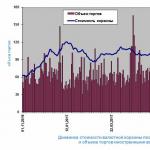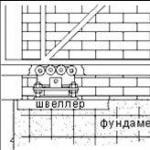At the request of graduates of the Unified State Examination and the OGE, if there are sufficient grounds, it can be carried out ahead of schedule. To do this, at the time of passing the GIA, it is necessary to successfully pass the intermediate certification and have an admission to pass the GIA. The procedure for admission to the early delivery of the GIA differs for different categories of graduates.
Graduates of the 9th grade can be admitted to the early delivery of the OGE only if there are good reasons, documented.
26. For students who do not have the opportunity, for valid reasons, documented to pass the GIA within the time limits established in accordance with paragraphs 24 and 25 of this Procedure, the GIA is carried out ahead of schedule, but no earlier than April 20, in the forms established by this Procedure. (p. 26)
Graduates of the 11th grade may be admitted to the early delivery of the exam at will.
29. For students, the GIA, at their request, can be carried out ahead of schedule, but not earlier than March 1, in the forms established by this Procedure. ()
Graduates of previous years having a certificate of completion of grade 11, college graduates, or students who received unsatisfactory results at the end of the GIA last year and left the school with a certificate, take the exam exclusively ahead of schedule or at an additional time.
For graduates of previous years, the Unified State Examination is held ahead of schedule, but not earlier than March 1, and (or) at additional dates for the Unified State Examination in the forms established by this Procedure.
Participation in the exams of graduates of previous years at other dates for the USE is allowed only if they have good reasons (illness or other documented circumstances) and the corresponding decision of the SEC. ()
In 2019, the early period for the exam is scheduled from March 20 to April 10, for passing the OGE - from April 22 to May 14.
How to resolve the issue of passing the GIA in the early period
Grade 9 students must additionally document that they cannot take exams during the main period for a good reason, such good reasons may be illness and the need to undergo a rehabilitation course in the main and additional periods of the OGE, moving the family to a permanent place of residence in another country and others exceptional cases. Grade 9 graduates who received unsatisfactory results at the end of the last year's OGE and have a certificate with the results of intermediate certification in their hands can be admitted to the early delivery of the OGE.
To pass the GIA early, students in grade 11 need to write an application addressed to the principal of the school, indicating the reason. As a rule, the need to pass the exam ahead of schedule arises:
- if in May-June they will be in sanatoriums and other medical institutions on medical and recreational or rehabilitation programs;
- if graduates are participants in competitions, olympiads or competitions, and the period of competition or training coincides with the deadline for passing the exam in the main stream. Such competitions and olympiads can be both national and international;
- if eleventh graders plan to move to live in another country after graduation. Note that the move may be associated not only with emigration, but also with plans to continue education on a student visa at a foreign university;
- if the graduates of evening schools this year have to go to military service.
Advantages of early delivery of the exam
The early stream USE options are no easier than the main stream options. The difficulty level of all variants of the current year is similar. However
More time to choose a university
One of the main advantages of early delivery of the exam is the additional time for making an important decision. Graduates who passed the exam ahead of schedule, by the end of April already know their results, and can calculate their chances of entering the chosen university. For this, open days and education fairs are suitable. And if the results of the exams do not please the graduate, then the decision on where to enter and what profession to choose will not have to be made in a hurry.
It is also important to reduce the pre-examination fuss. The last two months of study will not be held in such tension as the rest of the students who take the exam in the main stream.
A calmer exam environment
The first spring wave of those who pass the exam is incomparably smaller than the main stream. So, in 2017, 26.5 thousand people took part in early delivery, and 703 thousand in the main flow. It should be noted, however, that in 2018, 41,000 graduates fell on the early wave. But despite the fact that the number of early adopters has grown, they are still very few compared to the main stream. It is easy to imagine the level of intensity of the nervously excited graduates who have gathered so massively in the main stream. The early wave in such a comparison looks much calmer: in large cities, only a few dozen people can gather at examination points, and only a few in smaller settlements. Do not forget about the graduates of past years, who could change their minds and not show up for the exam early. In addition, since it is the graduates of previous years who make up the bulk of the early wave, the atmosphere in the classrooms is less tense, because they are more relaxed about exams due to their age. Being able to calm down on an exam is essential to getting successful results. Also, a small number of people in the audience minimizes preliminary briefing: verification of barcodes, control of filling out forms, and so on, which also reduces excitement.
Good organization and comfortable conditions
In 2018, about 41,000 people took the USE ahead of schedule, mostly graduates of previous years. Since there were few takers, only 245 examination sites were used. For a small number of examination points, the removal of special attention to all organizational issues is characteristic. Therefore, in the early period there are practically no technical problems and organizational violations usually do not occur. It is also unlikely that there will be a shortage of additional forms or, for example, the absence of clocks in the classroom.
Many cities in Russia are characterized by a very changeable summer. Therefore, taking exams at the end of May and June may not be very comfortable physically. If there is a hot day during the exam, it can become quite stuffy in the classroom, and the organizers do not always agree to open the windows. In a cold summer, you can face the opposite situation - in June, the heating has long been turned off, the audiences are cold and the cold also makes it difficult to concentrate. In the spring, in the early period of passing the exam, the temperature in the classroom is more predictable.
Quick check
Since a smaller number of works are checked in the early period of passing the exam, experts cope with the check faster. Usually the work is checked 7-9 days, but scores can be published a few days earlier. When submitting in the main stream, the verification of works takes about two weeks.
Cons of passing the exam in the early period
Less preparation time
The main disadvantage of early delivery of the exam is less time for preparation compared to the main stream. This will be the most important drawback for eleventh graders who decide to take the exam ahead of schedule. This is due to the fact that some topics of the school course included in the USE program can be studied at the very end of the school year. Graduates will have to get acquainted with them on their own.
The surprise of changes in KIM USE
As you know, every year the exam options change. Since the early period is the first wave, new control and measuring materials are presented on it. Graduates who will take the exam in the main stream, teachers will have time to prepare for the changes, focusing on the data published after the early delivery. Such data are FIPI demo versions and options that were solved in an early stream. Those who are going to take the exam in the spring cannot count on such luxury and must be prepared for the unexpected.
Harder to prepare
Graduates who take exams in the main stream first take trial exams, which take place at the end of the academic year. Due to the fact that the early wave of passing takes place in March-April, graduates who join it are deprived of the opportunity to take exams for trial. Sometimes you can find practice exams in district departments of education, but often such an exam turns out to be paid. Many students use online servers for preparation, but this method can also fail. Often, site owners, when laying out options, are guided by the deadlines for the delivery of the main stream and do not have time to adapt KIM to all the changes of this year.
Territorial remoteness of the exam
As we have already mentioned, the number of people who pass the exam ahead of schedule is not numerous. Accordingly, much fewer examination points are organized. For comparison, in the early period in 2018, 245 examination points were organized, and in the main stream of 2017 - 4.5 thousand. This leads to the fact that residents of all districts of a territorially large city can take the exam in one of the subjects at one point. For residents of remote areas, this can be quite problematic.
Publication date:
Wednesday, June 27, 2018

Clear organization
Quick check

Less preparation time

Taking exams from home
Each student annually passes two sessions in the terms established by the educational institution. Session - the final test of the student's knowledge obtained during the academic semester. But there are emergency situations that fall during the period of passing session tests and exams. In this case, the student decides to take them ahead of schedule. Hand over ahead of schedule session possible only within the academic semester. How to do it?

Instruction
Try to negotiate with teachers in whose disciplines it is possible to get an automatic grade.
Write to the dean's office in the name of the dean with a request for permission to pass and offset ahead of schedule. In the application, indicate the reason and a document confirming the need for early delivery of the session. The reasons may be observation on a stationary one, childbirth, the coincidence of the timing of sessions in different ones, a call on a business trip from work, etc. It is possible that the permission of the Vice-Rector for If they pass a verdict in your favor, they will indicate the specific dates for the session, but no later than the beginning of the test week.
Get a referral to pass a test or exam early.
note
There are usually 1-2 days left to prepare for the exam, so it is very difficult to pass. Remember that all early exams are taken one on one with the teacher and it is almost impossible to use cheat sheets.
Related article
A session at the university is the period of passing exams by students, after their six-month study at the university. The session is winter and summer, respectively, and for most students is one of the most difficult and responsible periods of study, but not for all. There are people for whom passing a session does not represent costs and incredible efforts. We will immediately exclude students who pay for exams from this list, this article is not about that.

Let's start with the fact that each student should ask himself the question why he came to this or that university. To get a diploma or to gain real knowledge that he will use throughout his life? People who study for a piece of cardboard that formally reflects their knowledge, as a rule, have a very hard time passing a session. They do not perform practical tasks, rarely appear in pairs. Hence the conclusion: study for the sake of gaining knowledge, attend all classes, write lectures, they will help you when passing the exam, and you do not have to read mountains of material from books. As a rule, answers to all exam questions can be found in the lecture notes that students write in lecture classes, and if you have all the notes, this will greatly facilitate your life while preparing for the exam. Reread at home the material that you wrote down at the lecture to consolidate it. Do not forget that teachers are your friends in terms of studying, and it is equally important for them that their students pass the session, so do not hesitate to clarify the points of the material that you do not understand, because then it can be very difficult to figure it out.
It's much easier to get an automatic credit than you think. The exception is perhaps the very first session of the first course. Here the student is checked how he is determined to learn. You will be required to attend classes and complete all tasks that are not difficult to complete if you have mastered the lecture material. Find out right away at the beginning of the school year which of the teachers puts the test automatically, and from which it is simply impossible to get it. Usually, teachers talk about this in the very first training sessions. Set a goal for yourself to get an automatic.
If possible, do not refuse to write a scientific report or other single work that is not given to all students. Grab it and try to connect the teacher, it will only play into your hands. You will earn the location of the teacher, you will be in sight, and with his help, make your work easier to a minimum.
Now let's move on to preparing for the exam. And the first picture that can appear in the imagination is the image of a student sitting at a table and surrounded by books at 3 o'clock in the morning on the very last day before the exam. This, of course, is also an option, but, frankly, not the easiest. To avoid this, do not postpone the preparation until the last day. Usually 3-4 days are given so that the student can fully prepare. Make a work plan for 3 days so that during this time all the questions are sorted out by you. At the consultation before the exam, ask questions that you could not understand. Thus, on the 4th day you will not have incomprehensible moments. Review the material and, most importantly, get enough sleep so that you wake up in the morning with a fresh head.
Sources:
- how to pass a student exam
Advice 4: Passing the exam early: advantages and disadvantages
Unified state exams in Russia take place in two "waves": the early period takes place in the spring, in March-April, the main one - after the end of the academic year, in the last days of May and June. At the same time, some categories of applicants have the right to independently choose the terms. And in order for the choice to be balanced, it is necessary to understand all the advantages and disadvantages of early exams.

Who can take the exam ahead of schedule
Those who have already fully mastered the school curriculum have the unconditional right to independently choose between the early and the main wave of passing the unified state exam. It:
- graduates of past years, regardless of the "statute of limitations" of the certificate (those who left the school many years ago and last year's graduates who want to improve their results have the right to take early exams);
- graduates of technical schools, lyceums and colleges, who have already fully completed the development of the course of a general education school.
In addition, some categories of eleventh-graders also have the right to take the exam without waiting for the end of the last academic year. These include:
- graduates of evening schools who this year will go to military service;
- children who, after leaving school, leave for permanent residence in another country - regardless of whether we are talking about emigration or a student visa to continue education at a foreign university or college;
- participants of all-Russian or international competitions, olympiads or competitions - if the period of competitions or training camps coincides with the main stage of passing the exam;
- eleventh-graders who in May-June will be in sanatoriums and other medical institutions on health-improving or rehabilitation programs;
- graduates of Russian schools located outside Russia - if they are located in areas with difficult climatic conditions.
In order to be able to take the exam ahead of schedule, eleventh-graders must write an application addressed to the director of their school, indicating the reason.
The main advantages of passing the exam in the early period
There is a common myth that the USE options for the early period are easier than for the main one. This is not the case, the level of difficulty of the options for all examinees of the current year is similar. However, some organizational features of the spring "wave" do allow some to achieve higher scores.
Less people - less nerves
The early period for passing the exam is incomparable in terms of mass with the main one. For example, in 2016, throughout Russia, 26,000 people passed exams ahead of schedule - and in the summer "wave" the number of examinees approached 700,000. As a result, not hundreds of extremely excited schoolchildren gather in megacities at exam points - but only a few dozen people ( and in smaller settlements, the number of “early” can go to a few). In addition, some graduates of previous years who applied for the exam may change their mind by the day of the exam and not appear for the test - as a result, 6-8 examiners can sit in an audience designed for 15 people. Moreover, some of them will be adults who usually perceive the exam than the average schoolchildren, “wound up” by numerous conversations that the USE will decide their fate.
This makes the overall psychological situation during the exam an order of magnitude less nervous. And, as the experience of many graduates shows, the ability to calm down and concentrate during the passing of the exam plays a decisive role. In addition, with a small number of applicants, the time for preliminary briefing and “organizational questions” is significantly reduced: printing and distributing tasks, checking the coincidence of bar codes, monitoring the completion of forms, and so on. And this also reduces the "degree of excitement."

Clear organization
Early delivery of the exam is considered the official start of the examination campaign. At this time, only a few examination points are working in the regions, while great attention is paid to the organization of work in them. Therefore, despite the fact that it is during the early period that all procedural innovations are usually “run in”, failures, technical problems and organizational violations usually do not occur. And the probability of encountering, for example, a lack of additional forms or the absence of hours in the audience tends to zero.
Predictable microclimate in the classroom
Passing exams at the end of May and June is fraught with another danger - on hot days it can be very stuffy in the exam room, and the direct rays of the summer sun can add to the discomfort. At the same time, the organizers of the exams do not always agree to open the windows. In the spring, during the heating season, the air temperature in the classroom is more predictable, and you can always dress “for the weather” so that you don’t get cold and sweat during the exam.
Quick check
During the early period of the Unified State Examination, the workload on experts checking papers is much lower - and, accordingly, papers are checked faster. It’s still not worth waiting for the results the next day after the exams - the official deadlines for checking the work of the early period are usually 7-9 days, while the scores can be published a couple of days before the deadline. During the main period, students usually have to wait for the results of the exam for about two weeks.
Time to develop an admissions strategy
Those who pass the USE ahead of schedule already by the end of April know their results for sure - and they have another two months to analyze in detail their chances of entering a particular university in the chosen direction, “targeting” go to open days and so on. And, even if the results turned out to be lower than expected, there is plenty of time to find a way out of this situation.
In addition, graduating students who “shoot back” with exams can spend the last two months of school life in a very relaxed way. While their classmates are diligently preparing for exams, writing samples and running around tutors, they can go about their business with a sense of accomplishment.

Disadvantages of early delivery of the exam
Less preparation time
The main disadvantage of passing the exam in the early period is obvious: the earlier the exam date, the less time for preparation. This may be especially important for graduates of the current year - after all, some topics of the school course included in the USE program can be studied in the fourth quarter of the last school year. In this case, you will have to get acquainted with them on your own, or with the help of a tutor.
The first "running in" of changes in the KIM USE
Control and measuring materials for most subjects are undergoing changes, and the early period for passing the exam is also the first of all innovations “in combat conditions”. During the preparation for the exams of the main period, the examinees and their teachers use as "official guidelines" both the FIPI demo version and the versions of the pre-terms published "after the fact". Those taking the exam in the spring are deprived of such an opportunity - they can use only a demo version as an example of a set of tasks. Therefore, the chances of encountering an unexpected assignment during the early period are much higher.

Fewer opportunities to prepare
Schoolchildren taking exams in March-April do not have the opportunity to take part in trial exams, which usually take place at the very end of the school year. However, district departments of education usually conduct training exams at earlier dates - but most often this service is paid.
In addition, the use of services for self-preparation for the exam can also cause difficulties: laying out options corresponding to the KIM of the current year, the owners of such services, as a rule, are guided by the terms of the main period. And, if you are taking a subject that is expected to change dramatically this year, the chance that a month before the early exam you will be able to find a service with a sufficient number of “plausible” options that are well adapted to the exam of the current year is quite low.
Taking exams from home
Since the number of those taking the USE ahead of schedule is small, the number of examination points is also greatly reduced. For example, residents of all districts of a large (and geographically “scattered”) city can take the exam in this subject at only one point. And for those who live in remote or “problematic” areas of the city in terms of transport, this can be a serious disadvantage. Especially considering that exams in different subjects can be held in different places in the city, so the route and travel time will have to be recalculated each time.
Applications for early passing the exam in 2017 were accepted until February 1 (inclusive), and the first exam was passed by schoolchildren and graduates of previous years already on March 23. This is two months before the main stage. In order not to be late next year, the site talks about the deadlines, required documents and ways to get the results of the exam.
Why before others?
Most often, the USE is passed ahead of schedule by graduates of previous years. They need an exam to enter the university. Currently, all Russian higher education institutions are asked to provide USE results upon admission, which are considered valid for four years following the year the exam was taken. In order to become one of those lucky ones who take exams earlier than others and enjoy the results a couple of months earlier, it is enough not to miss the application deadlines and collect all the necessary documents. But first things first.
I want to be one of the first! Can?
In order for everyone to pass the exam, it was divided into three stages: early, main and additional.
Early delivery is designed mainly for graduates of past years - those who want to improve their USE results or those who graduated from school before the introduction of the Unified State Exam. This year's graduates can also take the exams ahead of schedule, but for this, the school's pedagogical council must give permission. You can get it in the absence of academic debt and the full implementation of the curriculum.
In the additional examination period from September 5 to September 16, graduates who failed to score the minimum required scores, that is, to cross the threshold, in May - June, can take the exam in mathematics (basic level) or the Russian language.
The main requirement that should not be forgotten is that the exam is taken once a year. The exception is graduates of the current year who did not pass the USE in Russian language and mathematics (basic level). If you do not achieve the minimum scores in one of these subjects, you can retake it in an additional period. In other subjects, in case of failure, it will be possible to try your hand only next year. .jpg)
The main thing is not to forget your passport
For early delivery, students apply for participation in the exam at their school. Graduates of previous years must apply for participation in the Unified State Examination at the offices of the Regional Information Processing Center of Moscow (RTsOI). From the documents you will need a passport and an original document on education.
The application must list the subjects in which you plan to take the exams. For graduates of the current year, exams in the Russian language and mathematics (for any of the two levels) are mandatory, the rest can be chosen independently (most often, depending on the profile of the university).
A passport will be needed not only when applying, but also for admission to the exam itself - the data will be checked against the list of participants, which is printed out from the regional information system.
Regardless of when you have an exam, there is one application deadline. This year, early exams began on March 23 and will end on April 14. Applications had to be submitted by February 1, 2017 inclusive. After this date, only applications from those who had good reasons, such as illness, were considered. Applications close two weeks before the start of the exams. .jpg)
The exam is available to everyone
The early stage of passing the exam is coming to an end, so we have collected advice from those who have already passed the exam, for those who are yet to do so. The guys share their personal experiences and tell what happened in the classroom, why they passed the exam ahead of schedule, and what should be paid attention to by those who will take the exam in the summer. The first subject is mathematics - profile and basic.
Galina Sysoeva
I passed the basic mathematics in the early period, because on May 22 I fly to Croatia for the World Dance Championship as part of the Russian team. During the exam, I was the only one in the audience, the rest of the guys passed profile mathematics in another room.
My set of documents was printed right in front of me and very quickly, after the observers helped with filling out the registration form.
The assignments in KIM were the same as in all the collections for which we were preparing. In my opinion, everything is simple.
I advise graduates not to worry during the exam and in the remaining time to solve all the tasks in a row - then there will be no surprises for you on the exam.
Nikita Dobrovolsky
I am retaking the exam in specialized mathematics this year, so I am doing it ahead of schedule. I can say that I got an easy option.
I'm not sure that I did all the tasks correctly, but some of them were much easier than those that I was used to during preparation.
I didn’t really like that it wasn’t written how to fill in part C correctly, so it took me seven sheets, and the rest - a maximum of three.
Yana Vetergan
I passed the exam in specialized mathematics ahead of schedule, because last year I made a mistake in the main period. I skipped the first task, forgot it, and wrote down all the answers in the wrong order.
This year I didn't like how everything was organized. Now KIMs are printed right in the classroom. While the teachers were printing them, the paper ran out, and they redid it all over again. Some students were nervous, others were laughing and joking.
The first part was very simple - there were no tasks that we did not solve. But the second part seemed difficult. The tasks are the same as in the collections, but much more calculations need to be done. If I solved the first part in an hour, then I spent the rest of the allotted time on solving the second part - although, in theory, this is how it should be done. A guy was sitting behind me, he even cursed several times because of the second part. Six out of 14 people left an hour later - I don’t know what they managed to decide there.
Alexey Ryabovsky
I already passed the exam in specialized mathematics, but I entered the wrong university where I wanted to. Decided to turn over.
The atmosphere was calm in the audience, the tasks were not easier than at the main stage, and even more difficult than last year. Graduates, remember that you have little time - this is the main difficulty that you will face in the exam.
I didn’t even use drafts from the experience of the previous year, knowing that there would be no time to rewrite. I wrote all the allotted hours without distraction. I did not have time to do the second part of the 16th task. It would have been at least half an hour, I would have decided to the end.
The most important advice is to decide. If you know how to solve this or that task, you won’t even have to think when you see the tasks - you will immediately start writing and save time.
If you are applying for a high score, then there will be no chance to sit and think.
There are situations in life when it is precisely on these dates that it is impossible to come to the exam. And then what? Lose a year and wait for the next year? Not necessary. Passing the exam (as well as any other important exams) takes place in 2 stages:
- The main stage (held at the end of the academic year, at the end of May-June);
- Early stage (held in the spring, in March-April).
What's more, some students can choose when to take their exams. But in order to understand whether you need it or not, let's figure out who these students are, as well as the main pros and cons of passing the exam early.
Who can take the early exam?

The following categories of persons are eligible for early surrender:
- Those who by the time of passing have fully mastered the school curriculum are graduates of schools of past years, technical schools, lyceums, colleges and schools;
- Students of 11 classes of evening schools who will have to carry out military service;
- Graduates of schools who are preparing to move for permanent residence in another country;
- Schoolchildren who take part in international or all-Russian Olympiads or competitions, the date of which coincides with the main stage of the USE;
- Schoolchildren who, at the time of the main stage of the Unified State Examination, will be in sanatoriums or other medical institutions to undergo medical, health or rehabilitation programs;
- Graduation students who are outside the country and due to difficult climatic conditions cannot return.
What does early USE 2017 mean: advantages

So, you don’t know how to pass the USE ahead of schedule in 2017? It is enough just to write an application addressed to the principal of the school, indicating the reason why you may be allowed to do this.
But is it true that the early exam is easier than the one that is held in the main period of delivery? Well, he definitely has certain advantages, but certainly not in the ease of the exam itself, but in this:
- Graduates are less nervous due to fewer people. For comparison: if last year more than 700,000 students took the exam during the main stage, then only 26,000 young people came to take the exam ahead of schedule. Agree, in such an almost friendly company you feel much more confident, which means you will be less nervous.
- Less hustle and bustle and better organization. Due to the fact that the early exam takes much less students, its structure is clearer and more organized. You can not be afraid that you will not have enough form or that there will suddenly be no clock in the audience.
- Optimal weather conditions. The weather in early to mid-spring is more predictable. At this time, you can not be afraid of heat, stuffiness, the negative effects of direct sunlight. So in any case, the early delivery of the exam takes place in more comfortable conditions.
- Fast check speed. You will learn much earlier about how you wrote the early version of the Unified State Examination 2017 (in chemistry, Russian, mathematics or another subject), since the load on observers and inspectors is much lower. Of course, you should not expect results the next day. To find out the results of the exam (early period 2017-2018), you will have to wait 7-9 days. Approximately 2-3 days before the deadline for the announcement of the results, it is already possible to monitor your results. For comparison: those who pass the exam in the main period have to live with the expectation for about two weeks. That's what the early version of the exam means!
- Additional time to think over the admission strategy. As soon as you managed to find out the results of the early Unified State Examination (2017-2018), you have additional weeks and even months for a detailed analysis of your situation and thinking about where to apply after all. At this time, you can go to different universities for open days, prepare for internal exams of the selected university, and even change your mind about the chosen direction. And, of course, devote yourself to rest, gaining strength and relaxation before a difficult academic year, if you still manage to do it.
Early delivery of the exam: disadvantages

Not everything is as simple as everything in our life. Let's deal with the minuses that promise us the early delivery of the exam:
- Less time to prepare. While others will have another 2 months to prepare for the exam and take classes with tutors, you will have to take an early exam. This is also bad because some of the topics included in the exam, schoolchildren pass during the last months of study. If you decide to take an early exam, you will have to prepare and understand the topic yourself.
- You become a "guinea pig" for all the changes that have not yet been introduced. If the organizers decide to introduce any innovations, you will be the first one they will test them on, so that the main period goes perfectly.
- Remote location for delivery. Since the number of applicants for early exams is significantly lower than the main flow of applicants, the number of places where exams will be taken is also significantly lower. For example, in the main exam period, you will be able to take an exam in the main area of \u200b\u200bresidence or study. If you live in a remote area, then for the place of delivery, places where it will be problematic to get to can be chosen.
In general, now you see the difference between the main and early stages of passing the exam. Each has its pros and cons, and you need to choose what is closer to you in spirit. And in order to alleviate your difficult lot, we offer you the future assistance of our specialists in the main types of student work that complicates the learning process so much (controls, abstracts, term papers, diplomas).


















